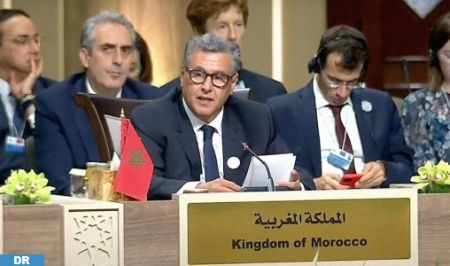
Morocco reiterates support for initiatives to establish lasting ceasefire in Gaza, become a living hell
Morocco, under the leadership of King Mohammed VI, firmly supports all initiatives aimed at establishing a lasting ceasefire in Gaza, delivering humanitarian aid, and protecting civilians, said head of the Moroccan Government Aziz Akhannouch on Tuesday.
Akhannouch who was addressing the high-level International Conference on the Urgent Humanitarian Response to Gaza, hosted by Jordan, emphasized Morocco’s call for a serious and constructive approach to these initiatives, advocating for the necessary conditions to achieve a two-state solution.
“The situation in Gaza cannot be summarized by the shocking numbers of civilian casualties, the massive destruction, or the reports of on-the-ground horrors. It is an unprecedented humanitarian tragedy, with over 2.3 million people in Gaza living in unbearable conditions,” Akhannouch stated.
The head of government highlighted the dire conditions in Gaza, exacerbated by the ongoing blockade and restricted access to aid. “Life in the Gaza Strip, the most densely populated area in the world, has become a living hell, marked by insecurity and lack of access to water, food, and medicine,” he added.
Akhannouch recalled the directives of King Mohammed VI, Chairman of the Al-Quds Committee, who ordered the urgent dispatch of humanitarian aid to Palestinians in Gaza and Al-Quds, along with additional scholarships for Palestinian students to attend Moroccan institutions.
Reiterating Morocco’s commitment, Akhannouch stated, “the Kingdom of Morocco is fully prepared to continue providing assistance and support to the Palestinians. Aid aimed at saving lives and alleviating suffering should never be held hostage by political conflicts.”
He emphasized the necessity of ensuring the smooth and unrestricted delivery of humanitarian aid through all crossing points, an argument consistently stressed by King Mohammed VI.
Morocco also insists that UN agencies, particularly UNRWA, must be allowed to conduct their humanitarian missions without obstacles. Akhannouch condemned any attempts at forced displacement and targeting of civilians, regardless of the reasons and justifications.
Military solutions, he noted, will not bring peace or stability. “Managing this conflict without a reasonable prospect for a solution will not ensure lasting security,” Akhannouch warned.
Akhannouch, who reaffirmed Morocco’s longstanding position, reiterated the justness of the Palestinian cause and support for the legitimate rights of the Palestinian people to establish an independent state within the June 4, 1967 borders, with East Al-Quds as its capital, based on the two-state solution. Dialogue and negotiation, he emphasized, are the only means to achieve a lasting, just, and comprehensive peace to prevent further humanitarian catastrophes.
The conference, organized jointly by Jordan, Egypt, and the United Nations under the theme “Call to Action: Urgent Humanitarian Aid for Gaza,” aims to bolster the international community’s response to the humanitarian crisis in Gaza. The event saw the attendance of UN Secretary-General António Guterres, US Secretary of State Antony Blinken, heads of state and government from over 75 countries, and representatives of humanitarian organizations and international financial institutions.
World leaders participating at the conference called on both Israel and Hamas to back a ceasefire proposal endorsed at the UN Security Council, saying it is the best way to alleviate suffering.
Actually, the conference was held on the morrow of the adoption by the UN Security Council of a resolution endorsing a US-backed ceasefire proposal that aims to end Israel’s eight-month assault on Gaza.
Fourteen countries voted for the United States-sponsored resolution, with Russia abstaining.
The resolution welcomes a three-phase ceasefire proposal announced by US President Joe Biden on may 31. The proposal calls for an initial six-week ceasefire and the exchange of some Israeli captives held in Gaza for Palestinian prisoners held in Israeli jails, the withdrawal of Israeli forces from populated areas in Gaza and the return of Palestinian civilians to all areas in the territory.
The second phase would include a permanent ceasefire and the release of the remaining captives. The third phase would involve a reconstruction effort for the devastated Gaza Strip.
The proposal urges Israel and Hamas “to fully implement its terms without delay and without condition”.
